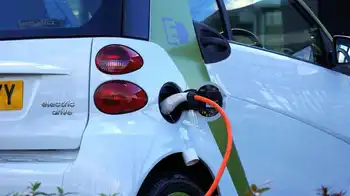Canadian EV technology on show
VANCOUVER, BRITISH COLUMBIA - Canadian technologies ranging from hemp-based car bodies to in-car systems that communicate with the electrical grid are being showcased by a project aimed at getting electric cars onto roads around the world.
The official launch of Project Eve was held at the EV 2010 Electric Vehicles Conference and Trade Show in Vancouver. The official design for the Kestrel, a four-passenger electric car made of a plant-based hemp composite, was unveiled by Calgary-based Motive Industries.
John Scott, director of Project Eve, which involves a consortium of 11 companies, said the goal is to bring together and showcase components made by Canadian companies for electric cars and the infrastructure to support them.
"So right out of the gate, the electric car that we're designing and actually have built is designed to give information back to the grid," he added.
That will help plan for future scenarios, he said, like one where 20,000 cars have driven to an NHL hockey game in -40 C winter weather and their owners need to ensure they're recharged before the game ends and they head home.
The consortium is already testing a two-passenger electric car, and hopes to release the Kestrel, along with a one-passenger three-wheeled vehicle, a small SUV and a delivery van, in the near future.
They are being produced in small quantities for corporate and government fleets for "beta testing" and not slated to be released to the public.
Instead, Scott said, the companies began discussion with business partners in Canada and abroad about possibly licensing the technologies so they can be developed in other countries.
The project was inspired by a similar U.S. hybrid consortium founded in 2000 to convince car manufacturers and the public that hybrid-electric cars could be reliable and cost-efficient. Since then, more than 44 hybrid models have been produced by car manufacturers.
"With respect to electric vehicles," Scott said, "if we take a similar approach - we prove out the technologies, we work on the cost, we cross the issues off, we learn to support these things in the marketplace - we might be able to see electric vehicles in Canada sooner rather than later."
Related News

The Evolution of Electric Vehicle Charging Infrastructure in the US
NEW YORK - The landscape of electric vehicle (EV) charging infrastructure in the United States is rapidly evolving, driven by technological advancements, collaborative efforts between automakers and charging networks, and government initiatives to support sustainable transportation.
Interoperability and Collaboration
Recent developments highlight a shift towards interoperability among charging networks. The introduction of the North American Charging Standard (NACS) and the adoption of the Combined Charging System (CCS) by major automakers underscore efforts to standardize charging protocols. This move aims to enhance convenience for EV drivers by allowing them to use multiple charging networks seamlessly.
Tesla's Role and Expansion
Tesla, a…




